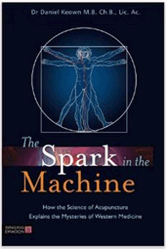Author: Daniel Keown
Reviewer: Bernie Clark, February 13th 2015
. .. it is electricity that kicks a cell into life. This electricity is intelligent; it carries information; it has Qi (pronounced “chi”); it is not dumb … it is eleQicity. [1]
.. it is electricity that kicks a cell into life. This electricity is intelligent; it carries information; it has Qi (pronounced “chi”); it is not dumb … it is eleQicity. [1]
Every serious student of Yin Yoga who wants to learn more about the energetic qualities of the practice should acquire, ingest and digest this new offering. Dr. Keown’s book deserves a spot in your library right beside Ted Kaptchuk’s Web That Has No Weaver: you may find The Spark to be more accessible and digestible than The Web.
In a folksy, funny and highly entertaining style, the good doctor leads us through an explanation of the science of acupuncture, both from its traditional Chinese viewpoint and from the Western view, the reason why acupuncture can be so effective – by looking at the embryological development of our organs, fascia and blood system, and he provides an overview of six main energy channels and their pertaining organs, something most Yin Yogis yearn to learn more about: the Kidneys/Urinary Bladder, the Heart/Pericardium, the Lungs/Blood, Spleen/Pancreas, the Liver/Gall Bladder, the Stomach/Guts.
One observation stuck with me in particular: “People who have strong Livers love to organize and make lists…” [2] Assuming the standard circularity of Chinese medicine applies, I intend to strengthen my Liver by creating several lists – lists of some of the nuggets of information I found fascinating and useful. Of course, to list everything I enjoyed and love about this book would take another full book, so I will just provide a sampling of the morsels you may enjoy as well.
Let’s start with the mystic entity, Qi: what is it? We discover that
- Qi could mean air or space. The Chinese symbol combines both rice and air, creating energy — Qi.
- Qi is more than simple energy, however. It is the energy of communication and intelligence; it is organizational energy.
- Qi guides the growth of our bodies from the first division of one cell into two, then four, and ultimately into the being you are today.
- Qi is the totality of the function of each organ.
- Like electricity, Qi (or eleQicity) moves along gradients, from inside to outside, following the path of least resistance, and these gradients are formed within our body by our fascia.
Yes, our fascia! Dr. Keown discusses fascia extensively and explains the importance of its function and intelligence in our growth and ongoing health. For yoga teachers, these sections of his book are quite enlightening.
- Imagine your home, with all its rooms, halls and walls, and even stairs leading to different levels. What creates all these spaces for activities in your home are the linings: the walls, the halls, the stairs — this is very analogous to the role fascia serves in providing the structure and spaces within our body.
- Fascia links – and it is the link between Eastern acupuncture and Western anatomy.
- Fascia prevents stuff from going where it should not go.
- Fascia guides the construction and growth of our structure.
- Surgeons stay within the fascial planes to minimize damage: this is called “keyhole surgery”.
- Fascia delineates tissues, telling things where they should be. Cells that ignore this structure are nasty cells. Cancer is a collection of nasty cells that have broken out of their originating organ space into other rooms. Cancer spreads through the fascia.
- In healthy bodies, substances and energy flow along fascial planes, not through them.
- The energy that flows along the paths of least resistance in our fascia is Qi. We can stimulate this Qi to flow in its proper place and at proper strength through acupuncture or acupressure.
Of course yoga teachers are not licensed to stick needles into students, but we do employ acupressure constantly, whether we realize it or not. Dr. Keown describes many studies that verify the efficacy of acupuncture:
- Endorphin levels increase – these are the body’s natural painkillers, however the painkilling medication we normally use can lead to nausea, which acupuncture does not cause.
- Acupuncture can lower blood pressure, regulate heart rhythm and open airways in the lungs.
- Stimulation of acupuncture points, which the Chinese call “caves”, moves Qi along the fascial boundaries to specific organs, stimulating health and healing from these organ functions.
It is important to distinguish the difference between the Western view of organs and the Chinese view of Organs. The Chinese talk about the function of the Organ, not simply their physiological appearance in one location of the body. Their concept is much broader and includes the functions often ascribed in the West to associated glands. Chinese Organs are hormonal and this allows each Organ to communicate with other Organs throughout the body. For example
- Kidney Water controls Heart Fire.
- In the West we know that the kidneys can release a hormone (renin) that can cause an action in the lungs to create another hormone (ACE) that can cause stress to the heart.
- The Heart is the organ of Fire within the Blood.
- If the heart stops beating, so goes the theory in the West, the brain is deprived of oxygen and death ensues. However, a heart attack can cause instant death, not a slow lingering brain decay. When the heart stop, it is like a light switch being thrown and quickly, instantly, everything stops. The heart is not simply a pump.
- The Pericardium is the gatekeeper to the Emperor (the Heart).
- The fascia of the pericardium is a very good electrical insulator, which shields the heart, acting like a Faraday cage. It can protect the heart from wayward energies.
- The Spleen is the Odd Organ
- Many people in the West have no idea what the spleen does.
- The Spleen cleans the blood, recycles platelets and filters both red blood cells and white blood cells. It recycles hemoglobin, returning it to the liver. It is an important part of our immune system.
- Meanwhile, its partner the pancreas controls the level of serotonin in our blood; through its enzymes creates the digestive fire that transforms food; and it provides hormones to allow the transportation of food (glucose.)
- The Spleen is the only organ that can completely regrow itself. This is because, in the Chinese model, the spleen and the pancreas are one Organ: the spleen grows on top of the pancreas like a flower atop its stem. (Removing the spleen doesn’t get rid of its stem, the pancreas.)
- The Liver is the General, who issues orders to all.
- It gets to see everything that you absorb from your food first, before any other organ does.
- The Liver controls the fatty aspect of our blood.
- The Liver is the primary organ for breaking down histamines – the chemicals released when the body is under attack or stressed, to heighten our immune response. Unfortunately, histamines do so by making us irritable: they irritate the body and they may also irritate the mind.
- Many people with Liver issues are irritable, angry people.
Dr. Keown goes on to discuss the Stomach, expanding its definition to include our guts in general. He talks at length about the Lungs, Kidneys and our various Bladders (Urinary and Gall). Throughout his discourse he adds clinical examples from his time working in the Emergency Ward, effecting cures that patients gladly accepted, but his co-workers shook their heads at. East meeting West has not happened easily, but this book helps to explain to us Westerners how what has been practiced for thousands of years in the East actually has a basis in modern science, as long as we look at the anatomical structure created by our fascia and trace its development back to our times in the womb as embryos.
For the yoga student and teachers, one key equation can be written from Dr. Keown’s wisdom: Fascia + Yoga = Health. Stress is produced by our yoga practice; this stress creates intelligent signals that course along fascial planes, instructing organs and their associated glands to become active, or to calm down their activities. Full, integrated communication throughout the body’s matrix results in full health and well-being.
Yin Yoga teachers and students – pick up a copy of this book. You will enjoy it immensely.
Footnotes:
